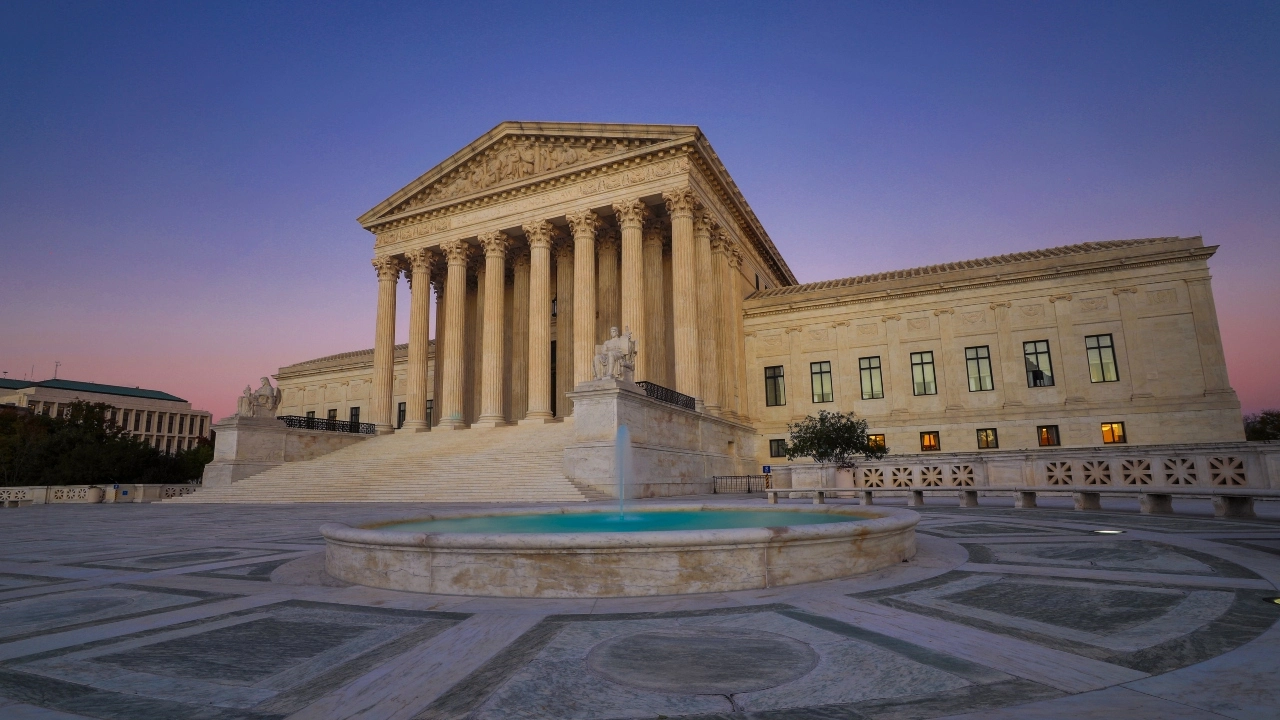Will the U.S. Supreme Court do what Congress and the White House have not and deliver the $32 billion U.S. cannabis industry from outdated federal marijuana laws?
An answer is inching closer after the highest court on Monday scheduled a meeting for next month to determine whether it will hear a constitutional challenge to federal cannabis prohibition.
If the court hears the case – and if the justices rule in the industry’s favor – cannabis operators could enjoy profound benefits, well beyond what’s promised if President Donald Trump makes good on his promise to consider marijuana rescheduling.
“Part of the reason why we brought the case in the first place was, people in this industry have been told for the better part of the decade relief is coming – and it hasn’t come, despite the fact that 38 states have authorized lawful sales,” attorney Josh Schiller of Boies Schiller, who is arguing the case, told MJBizDaily recently.
“Why is the federal government so far behind more than two-thirds of the country? We don’t know, we can’t explain it,” he added.
“It is just apparently such a low priority, and this case was a way to shake the box a little bit.”
Supreme Court challenge to cannabis prohibition moving along
The court will meet behind closed doors on Dec. 12, according to the docket for Canna Provisions et al vs. Bondi, the lawsuit brought by four marijuana companies that seeks to bring federal cannabis policy before the nation’s highest court for the first time in 20 years.
The court is likely to consider taking up the case in January, Schiller said.
Chicago-based multistate operator Verano Holdings and three Massachusetts-based co-plaintiffs sued the U.S. Department of Justice in October 2023, claiming that federal restrictions on marijuana in the Controlled Substances Act are no longer constitutional.
In addition to Verano, the appellants are Canna Provisions, a Massachusetts cannabis retailer; Gyasi Sellers, the CEO of the Treevit delivery service; and Wiseacre Farm, a cultivator.
The last time federal cannabis laws came before the court was 2005, in Gonzalez vs. Raich.
That was before a single state allowed adult-use cannabis sales. Since then, the legal landscape as well as public opinion have changed dramatically.
And conservative justices, chief among them Clarence Thomas, have questioned prohibition’s validity.
“We do believe there’s been a desire to find the right case to effectively overturn Gonzalez vs. Raich,” Schiller said.
SCOTUS challenge promises benefits beyond marijuana rescheduling
The crux of the argument is that conditions have changed so much since the high court’s 2005 ruling – more than two dozen states have legalized adult-use marijuana – that the factual basis for that ruling no longer exists.
The case also references comments made in a separate case in 2021 by Thomas, who suggested federal marijuana law might not be “necessary or proper.”
During oral arguments last December, attorney David Boies – a prominent litigator who has argued other major cases before the highest court – contended that congressional action since the 2005 ruling, including a budget rider protecting medical marijuana businesses from federal prosecution, means that federal lawmakers no longer intend to ban interstate cannabis commerce.
So far, that argument has failed – first in U.S. District Court last year and in May at the 1st U.S. Circuit Court of Appeals.
In their appeal, the companies argued that:
- The U.S. Constitution affords them a “right to cultivate and transact in marijuana” that is “deeply rooted in this nation’s history and its legal traditions.”
- The Controlled Substances Act violates the Fifth Amendment’s right to due process.
If the Supreme Court hears the case and it’s successful, cannabis companies could expect:
- Relief from Internal Revenue Code Section 280E.
- Easier access to banking services, institutional investment and mainstream exchanges.
Cannabis companies, including the major marijuana multistate operators already claiming refunds from the Internal Revenue Service on the basis that 280E doesn’t apply, may also have an easier time in tax court, Schiller added.
“There would be people in a place to claim refunds that would be substantial,” he said.
Subscribe to the MJBiz Factbook
Exclusive industry data and analysis to help you make informed business decisions and avoid costly missteps. All the facts, none of the hype.
What you will get:
- Monthly and quarterly updates, with new data & insights
- Financial forecasts + capital investment trends
- State-by-state guide to regulations, taxes & market opportunities
- Annual survey of cannabis businesses
- Consumer insights
- And more!
What the Supreme Court won’t legalize
Central to the case is the argument that federal cannabis prohibition is unconstitutional because it interferes with the states’ ability to regulate trade within their own borders.
Because of that, and because states already regulate adult-use cannabis – and do not allow for out-of-state product – interstate commerce is unlikely to be legalized as a result of a court case, Schiller added.
The case is also unlikely to affect the federal ban on hemp THC that’s scheduled to go into effect in November 2026.
The redefinition of hemp, which excludes products like delta-8 THC and THCA flower from federal protection, passed via the spending bill that ended the record government shutdown and was signed into law by President Trump on Nov. 12, giving Congress the power to regulate trade.
And many states have already banned or strictly regulated hemp THC.
However, the legitimization of cannabis via the court could lure even more major corporations to enter cannabis, along with some of the consumer-packaged goods (CPG) giants from alcohol and tobacco already flirting with the sector.
“I don’t think McDonald’s will start selling Happy Meals that make you really happy,” Schiller said.
“But they might. The stigma may be completely gone at that point.”
Chris Roberts can be reached at chris.roberts@mjbizdaily.com.
Medical Disclaimer:
The information provided in these blog posts is intended for general informational and educational purposes only. It is not a substitute for professional medical advice, diagnosis, or treatment. Always seek the advice of your physician or other qualified healthcare provider with any questions you may have regarding a medical condition. The use of any information provided in these blog posts is solely at your own risk. The authors and the website do not recommend or endorse any specific products, treatments, or procedures mentioned. Reliance on any information in these blog posts is solely at your own discretion.






